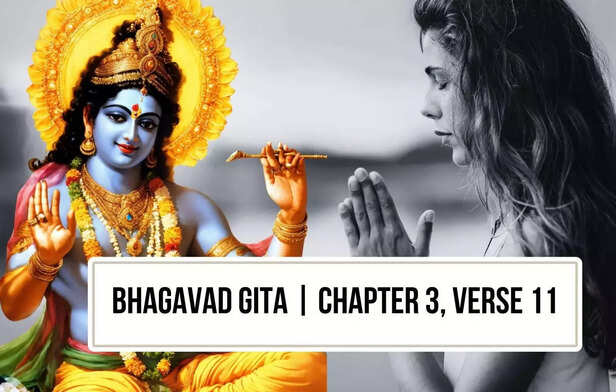You Can Win the World and Still Lose to Your Mind — The Gita Warned Us
Nidhi | Jun 10, 2025, 15:57 IST
( Image credit : Times Life Bureau, Timeslife )
You can conquer kingdoms, achieve greatness, and win the admiration of the world—but still be a slave to your own mind. In this powerful exploration of the Bhagavad Gita's timeless wisdom, we uncover how inner mastery is far more vital than external victory. The Gita reveals that the real war is not fought on battlefields, but within—against desire, ego, and restlessness. This article breaks down key teachings that explain why controlling the mind is the first and final step toward true success.
शत्रौ मित्रे पुत्रे बन्धौ मा कुरु यत्नं विग्रहसन्धौ
“Make no effort to discriminate between enemy and friend, son and brother.”
— Bhagavad Gita 6.9 In the grand theatre of the Mahabharata, warriors like Arjuna prepared to conquer kingdoms, reclaim honour, and fulfill their dharma. But long before a single arrow was released, the Gita asked a more dangerous question: Have you conquered your own mind?
This was not a metaphor. The Bhagavad Gita asserts, again and again, that the fiercest battles are not fought with weapons or words — they are fought in the realm of thought, impulse, fear, ego, and illusion. A man may win empires, armies may obey his command, yet if he is defeated by his own attachments, emotions, or desires, he is no victor at all.
Today, in boardrooms, parliaments, and even within our personal ambitions, this warning echoes louder than ever. The world celebrates outer success. But the Gita reminds us: Inner chaos can undo everything.

आत्मैव ह्यात्मनो बन्धुरात्मैव रिपुरात्मन:
“The mind is the friend of the conditioned soul, and his enemy as well.” (Gita 6.5)
The Bhagavad Gita does not romanticize the mind. It treats it as a force — neutral in essence, but powerful in impact. When governed by clarity, it becomes a companion. When ruled by confusion, it becomes the very saboteur of one’s life.
The mind becomes an enemy when it is reactive — when it clings to praise, shrinks at criticism, and gets agitated by loss or gain. It distorts reality, inflates ego, and fosters fear. The same mind, when disciplined through discernment (viveka), becomes a mirror that reflects truth rather than illusion.
 The Gita questions the very idea of success. It doesn’t define winning as defeating others but as transcending the grip of personal bondage — likes, dislikes, anxiety, or pride.
The Gita questions the very idea of success. It doesn’t define winning as defeating others but as transcending the grip of personal bondage — likes, dislikes, anxiety, or pride.
A man may rise to rule nations, but if anger governs his decisions, if grief drives his judgment, or if restlessness steals his peace — then he is still a servant, not a master.
This is not spiritual exaggeration; it is psychological realism. Leaders collapse not due to opposition, but due to their inability to manage desire, envy, or insecurity. The Gita sees such ungoverned minds not as accidental misfortunes but as consequences of inner neglect.

चञ्चलं हि मन: कृष्ण प्रमाथि बलवद्दृढम्
“The mind is restless, turbulent, strong, and obstinate.” (Gita 6.34) Even Arjuna, a warrior of great discipline, confesses the difficulty of controlling the mind. Krishna agrees — it is indeed restless. But he also insists that it is not uncontrollable.
The tools? Abhyasa (practice) and Vairagya (detachment). Through constant effort and the ability to let go of craving, one gradually weakens the mind’s volatility.
This is not about suppressing thought but refining it — directing it inward, observing it without reaction, and understanding its mechanisms.

ध्यायतो विषयान्पुंस: संगस्तेषूपजायते
“Contemplating objects of the senses, one develops attachment...” (Gita 2.62) Desire is not merely wanting. It is fixation. The Gita explains a precise chain: from desire comes attachment, from attachment comes anger, from anger delusion, and from delusion — the loss of memory and intellect.
This chain is not philosophical poetry — it is psychological precision. Most self-sabotage begins not with action but with unexamined craving. The moment a thought becomes obsessive, we have already begun to lose clarity.
Mental defeat begins with overidentifying with a thought or object. What the Gita teaches is not renunciation of the world, but renunciation of the mind’s slavery to it.

समत्वं योग उच्यते
“Evenness of mind is called yoga.” (Gita 2.48) True victory, according to the Gita, is not in winning or losing, but in maintaining inner balance through both. Equanimity (samattvam) is the ability to remain undisturbed by success or failure, pleasure or pain, gain or loss.
This doesn’t mean indifference — it means freedom. When the mind is trained to remain centered, circumstances lose their ability to disturb one’s peace.
Equanimity is the armor of the wise. It is not emotionless detachment but spiritual steadiness — the refusal to let the external world dictate one’s internal state.

One of the most overlooked ideas in the Gita is this: You cannot fulfill your dharma if your mind is unstable.
A mind consumed by fear cannot act courageously. A mind entangled in anger cannot serve justice. A mind driven by greed cannot perform selfless duty.
Dharma is not only about action — it is about consciousness. If the mind is not in alignment with clarity, then even noble actions become corrupted at the root.
The Gita demands that before you fight the battle outside, you must first discipline the battlefield within.

उद्धरेदात्मनाऽत्मानं नात्मानमवसादयेत्
“One must elevate, not degrade, the self by the self.” (Gita 6.5) The Gita’s message is revolutionary. It reverses the outer hierarchy of power. Kings and conquerors are not the highest beings. The highest are those who master themselves.
The Gita calls them sthitaprajña — those of steady wisdom. Their peace is not based on outcomes. Their clarity is not dependent on praise. They remain unmoved by storm or calm, because their minds are not slaves to circumstance.
This, Krishna says, is the true freedom — not external liberty, but internal sovereignty. Not the power to control others, but the power to remain untouched by one’s own lower impulses.
Today, the war of Kurukshetra may no longer rage with chariots and bows. But the inner war continues. The Gita is not asking us to abandon the world. It is warning us: Don’t let the world conquer your mind.
You can build an empire, be adored by millions, or achieve every goal — and still fall apart inside if your mind is untrained. You can defeat nations and still be defeated by your own craving, rage, or despair.
Krishna does not glorify withdrawal — he glorifies mastery in motion. He calls us not to escape the world, but to stand fully in it, clear-eyed and centered, unshaken and awake.
Because in the end, the true hero is not the one who wins the world,
but the one who is not broken by it.
Explore the latest trends and tips in Health & Fitness, Travel, Life Hacks, Fashion & Beauty, and Relationships at Times Life!
“Make no effort to discriminate between enemy and friend, son and brother.”
— Bhagavad Gita 6.9 In the grand theatre of the Mahabharata, warriors like Arjuna prepared to conquer kingdoms, reclaim honour, and fulfill their dharma. But long before a single arrow was released, the Gita asked a more dangerous question: Have you conquered your own mind?
This was not a metaphor. The Bhagavad Gita asserts, again and again, that the fiercest battles are not fought with weapons or words — they are fought in the realm of thought, impulse, fear, ego, and illusion. A man may win empires, armies may obey his command, yet if he is defeated by his own attachments, emotions, or desires, he is no victor at all.
Today, in boardrooms, parliaments, and even within our personal ambitions, this warning echoes louder than ever. The world celebrates outer success. But the Gita reminds us: Inner chaos can undo everything.
1. The Mind Is Both Ally and Enemy

Mind.
( Image credit : Pexels )
आत्मैव ह्यात्मनो बन्धुरात्मैव रिपुरात्मन:
“The mind is the friend of the conditioned soul, and his enemy as well.” (Gita 6.5)
The Bhagavad Gita does not romanticize the mind. It treats it as a force — neutral in essence, but powerful in impact. When governed by clarity, it becomes a companion. When ruled by confusion, it becomes the very saboteur of one’s life.
The mind becomes an enemy when it is reactive — when it clings to praise, shrinks at criticism, and gets agitated by loss or gain. It distorts reality, inflates ego, and fosters fear. The same mind, when disciplined through discernment (viveka), becomes a mirror that reflects truth rather than illusion.
2. Victory Without Inner Mastery Is Hollow

Chess
( Image credit : Pexels )
A man may rise to rule nations, but if anger governs his decisions, if grief drives his judgment, or if restlessness steals his peace — then he is still a servant, not a master.
This is not spiritual exaggeration; it is psychological realism. Leaders collapse not due to opposition, but due to their inability to manage desire, envy, or insecurity. The Gita sees such ungoverned minds not as accidental misfortunes but as consequences of inner neglect.
3. The Mind Is Restless by Nature — But Not Beyond Discipline

Discipline
( Image credit : Pexels )
चञ्चलं हि मन: कृष्ण प्रमाथि बलवद्दृढम्
“The mind is restless, turbulent, strong, and obstinate.” (Gita 6.34) Even Arjuna, a warrior of great discipline, confesses the difficulty of controlling the mind. Krishna agrees — it is indeed restless. But he also insists that it is not uncontrollable.
The tools? Abhyasa (practice) and Vairagya (detachment). Through constant effort and the ability to let go of craving, one gradually weakens the mind’s volatility.
This is not about suppressing thought but refining it — directing it inward, observing it without reaction, and understanding its mechanisms.
4. Desire Is the Seed of Mental Defeat

Prayer
( Image credit : Times Life Bureau )
ध्यायतो विषयान्पुंस: संगस्तेषूपजायते
“Contemplating objects of the senses, one develops attachment...” (Gita 2.62) Desire is not merely wanting. It is fixation. The Gita explains a precise chain: from desire comes attachment, from attachment comes anger, from anger delusion, and from delusion — the loss of memory and intellect.
This chain is not philosophical poetry — it is psychological precision. Most self-sabotage begins not with action but with unexamined craving. The moment a thought becomes obsessive, we have already begun to lose clarity.
Mental defeat begins with overidentifying with a thought or object. What the Gita teaches is not renunciation of the world, but renunciation of the mind’s slavery to it.
5. Equanimity Is the Mark of the Victorious Mind

Yoga
( Image credit : Pexels )
समत्वं योग उच्यते
“Evenness of mind is called yoga.” (Gita 2.48) True victory, according to the Gita, is not in winning or losing, but in maintaining inner balance through both. Equanimity (samattvam) is the ability to remain undisturbed by success or failure, pleasure or pain, gain or loss.
This doesn’t mean indifference — it means freedom. When the mind is trained to remain centered, circumstances lose their ability to disturb one’s peace.
Equanimity is the armor of the wise. It is not emotionless detachment but spiritual steadiness — the refusal to let the external world dictate one’s internal state.
6. The Unstable Mind Betrays Dharma

Sadness
( Image credit : Pexels )
One of the most overlooked ideas in the Gita is this: You cannot fulfill your dharma if your mind is unstable.
A mind consumed by fear cannot act courageously. A mind entangled in anger cannot serve justice. A mind driven by greed cannot perform selfless duty.
Dharma is not only about action — it is about consciousness. If the mind is not in alignment with clarity, then even noble actions become corrupted at the root.
The Gita demands that before you fight the battle outside, you must first discipline the battlefield within.
7. The Highest State Is Mastery Over the Mind — Not the World

Illusion of Mind
( Image credit : Pexels )
उद्धरेदात्मनाऽत्मानं नात्मानमवसादयेत्
“One must elevate, not degrade, the self by the self.” (Gita 6.5) The Gita’s message is revolutionary. It reverses the outer hierarchy of power. Kings and conquerors are not the highest beings. The highest are those who master themselves.
The Gita calls them sthitaprajña — those of steady wisdom. Their peace is not based on outcomes. Their clarity is not dependent on praise. They remain unmoved by storm or calm, because their minds are not slaves to circumstance.
This, Krishna says, is the true freedom — not external liberty, but internal sovereignty. Not the power to control others, but the power to remain untouched by one’s own lower impulses.
A Silent Battlefield
You can build an empire, be adored by millions, or achieve every goal — and still fall apart inside if your mind is untrained. You can defeat nations and still be defeated by your own craving, rage, or despair.
Krishna does not glorify withdrawal — he glorifies mastery in motion. He calls us not to escape the world, but to stand fully in it, clear-eyed and centered, unshaken and awake.
Because in the end, the true hero is not the one who wins the world,
but the one who is not broken by it.
Explore the latest trends and tips in Health & Fitness, Travel, Life Hacks, Fashion & Beauty, and Relationships at Times Life!
